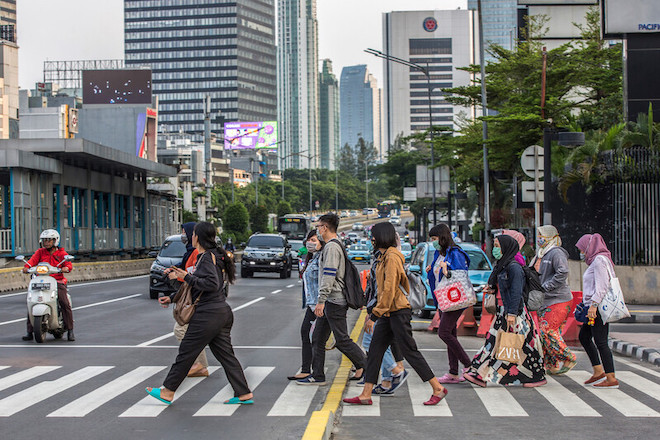
This article is published in collaboration with Mott MacDonald.
Successful cities provide opportunity and amenity from which stem jobs, entrepreneurship and economic vitality, learning, recreation and social care, artistic creativity, and cultural richness.
These benefits are enabled by social and physical infrastructure systems that are intricately linked and mutually reinforcing—a joined-up system of systems focused on social, economic, and environmental outcomes. Achieving ever-better outcomes requires in-depth knowledge of each system, and of the complex interactions and interdependencies between them all.
Better connectivity, involving information flow and increasingly enabled by technology, can provide this insight and understanding—so that synergies can be achieved, interventions designed, performance optimized, value created, and well-being advanced. The benefits of connectivity can be driven further by integrating physical and digital infrastructure to make smart infrastructure.
This is how we can create smart cities that are more efficient, resilient, and capable, despite stretched financial and human resources.
Better data, better outcomes
Securing the benefits of digitalization requires wise technology choices. But smart city projects focused predominantly on technology have failed. Success depends on socio-technical change focused on desired social, economic, and environmental outcomes, and supported by people with the skills, mindset and behaviors to use technology to those ends.
With the right focus and support, collecting, sorting, structuring, and analyzing data will give enhanced insights into citizen aspirations and choices. This information will allow better decision-making that is responsive to people’s changing needs, leading to more sustainable solutions that deliver enhanced outcomes.
Those who develop smart city solutions should understand that a city’s remit covers social issues and safeguarding of the disadvantaged and marginalized, not just promoting economic growth and the provision of essential services. Smart cities cannot be said to be smart if they do not deliver better outcomes for people and the planet.
The following focused actions will support the digital transformation of cities and help bring about positive, inclusive change in line with the United Nations' Sustainable Development Goals (SDGs):
1: A place-based approach to SDGs
There is growing recognition that local government often has a stronger understanding of local problems and opportunities, which can be enhanced through citizen participation. Many European cities are championing a consultative and inclusive stakeholder-centred approach through toolkits such as the Reference Framework for Sustainable Cities.
Smart cities can provide system-level data to improve integrated planning, enable transparent and replicable decision-making, and track progress toward outcomes such as carbon reduction.
With system-level data platforms, we can evaluate climate actions based on multiple synergetic objectives, not just carbon reduction but also local impacts on air quality, flood risk, food poverty, energy poverty, health, and well-being. This is one of the core principles of a place-based systems approach employed by Mott MacDonald to help cities, towns, and communities accelerate toward net-zero.
2: Implement smart solutions that are sustainable
Cities can suffer from "pilot project fatigue" after implementing new smart city solutions that have not been designed to provide sustainable benefits and which may even exacerbate the socioeconomic divide between those with and without access. Cities also risk procuring technology services which have hidden lock-ins and costs.
Sustainability and continuity can be achieved through partnerships—between cities, academia, donors, investors, and the private sector—and appropriate capacity building. Providing the necessary institutional capacity building needed for long-term focus and success has been a key feature of our work as the lead delivery partner for the Global Future Cities Programme in Southeast Asia, and for the Global Infrastructure Programme.
3: Seek simplicity in implementation and monitoring
City authorities have limited resources and need simplicity and proven approaches in how to implement and monitor smart and sustainable action plans. However, there is now an overwhelming range of methods, standards, and tools available with yet more being developed. These are all well intended but they are not aligned, and there is duplication.
Standards bodies and donors should focus on consolidating approaches, together with a scalable reference architecture for reporting and monitoring needs. This must focus on outcomes and information—not just the tools—for cities to better connect and move forward with their action plans.
A consistent, internationally recognized framework is provided through ISO 37101, which we will be using as a basis for urban transformation to develop open, collaborative, people-centric, and digitally enabled operating models for cities that put their individual vision for a sustainable future into operation.
4: Responsible scaling up of technology
Investment is needed in scalable innovation and technology but such scaling up must be socially and environmentally responsible as well as financially viable.
Let us not let allow history to repeat itself. We are now, hopefully, nearing the end of more than a century of technology lock-in from upscaling the hydrocarbon-fuelled combustion engine with its myriad unforeseen consequences. As we scale up new technologies to address the climate emergency and pursue the benefits of digitalization, we must not make the same mistakes.
Leave no one behind
Universal connectivity is key to all of this.
I am based in Singapore where citizens benefit from full internet access and connected government services. By contrast, only about 70% of the global population is online, which means that three billion people are still disconnected. We must close the digital divide.
Cities can play a major part in achieving this, improving social inclusion and resilience, and creating better urban futures for all.
This article was adapted from a story published by Mott MacDonald in October 2022.
 Derek Murray
Derek Murray
Digital Advisory Lead for ASEAN and East Asia, Mott MacDonald
Derek Murray is a digital innovation advisor with 25 years’ industry experience. He has served global and regional technology leadership roles for Mott MacDonald in the UK, Middle East, and Southeast Asia and is chair of the ICT (Information and Communications Technology)/Tech Committee at the British Chamber of Commerce in Singapore, where he is based.
He has led the development and deployment of ICT and digital strategies, relating to smart and sustainable communities, infrastructure transformation and digital delivery on a regional and global scale, increasing adoption and value from services for clients, colleagues, and our communities. He is an advisor to city and national level programs on diverse digital transformation needs, including infrastructure procurement and data protection matters.


